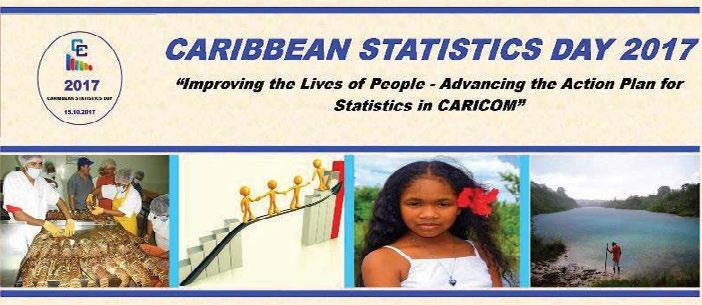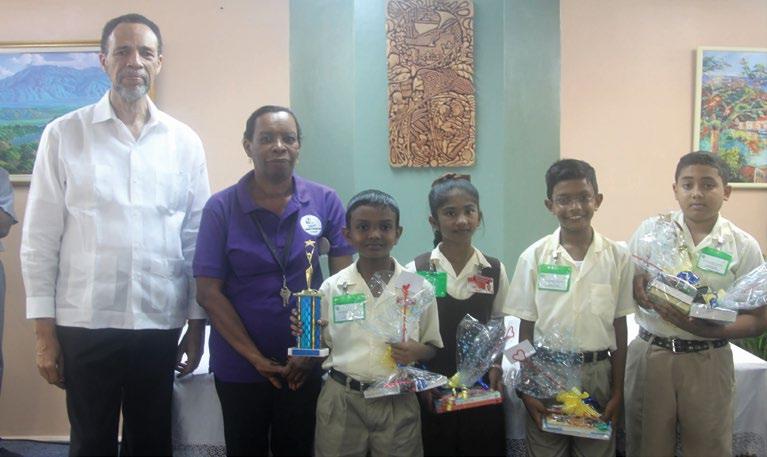
6 minute read
Section VIII - Statistics
The Regional Strategy for the Development of Statistics (RSDS) is a key component of the Action Plan for Statistics which was endorsed by Heads of Government in 2016. In July, Heads of Government endorsed the preparation of the Regional Strategy, emphasising the importance of accurate data to monitor and implement effective national and regional policies, particularly in relation to the CSME and the UN 2030 Agenda for Sustainable Development.
The RSDS will be a master-plan for statistical development in the Region. It will build on the initiatives and frameworks already established to improve the range and quality of statistics at the national and regional levels. It will provide the foundation for evidenced-based decision-making across the Community.
The Assessment Phase of the RSDS, which commenced in late 2016, continued into 2017. A comprehensive assessment of regional and national statistical systems was conducted during the year, building on the results of an assessment of National Statistical Offices conducted between 2011 and 2013. Also, consultations on the comprehensive assessment were held during the year with Member States, the CARICOM Secretariat, Community Institutions, as well as other regional and international organisations and other users of statistics.
Following reviews by national statistical offices and the CARICOM Advisory Group on Statistics, a draft Assessment Report and elements of a Strategic Framework for the RSDS were presented to the Standing Committee of CARICOM Statisticians (SCCS) in October. The Assessment Report was revised based on comments and observations from the Standing Committee and has been disseminated to Member States for feedback. A draft of the Strategic Framework for the RSDS has also been circulated for feedback.
2020 Round of Population and Housing Census
Work advanced during the year to prepare and implement the regionally-coordinated Strategy to support Member States and Associate Members in the conduct of the 2020 Round of Population and Housing Census. In May, statistics officials from across the Region participated in a workshop to develop a common census questionnaire for the 2020 Census. Participants reviewed the 2010 CARICOM common census questionnaire; examined ways of enhancing the harmonisation of the census information; reviewed lessons learnt; and identified best practices in executing, producing and disseminating the census and analysing the results.
The workshop, held in Barbados and conducted by the CARICOM Secretariat, was supported by Member States, the Government of Canada, UNFPA, and the Partnership in Statistics for Development in the 21st Century (PARIS21).
The Common Census Questionnaire was completed by the end of the year, taking into consideration issues related to regional integration, in particular the CSME, the Community Strategic Plan, and the SDGs.
2030 Sustainable Development Goals (SDGs): CARICOM Core SDG Indicators
Also during the year, work to incorporate the UN 2030 Agenda for Sustainable Development in the Community moved forward. On the recommendation of the SCCS, a TWG was established in May, to review the global SDG Indicators and identify a core set of indicators which CARICOM countries could start producing, based on regional and national priorities. The TWG comprises representatives of ten Member States namely, Antigua and Barbuda, The Bahamas, Barbados, Belize, Dominica, Jamaica, Grenada, Saint Lucia, St. Vincent and the Grenadines and Suriname.
The TWG has identified 109 CARICOM Core Indicators which have been endorsed by the SCCS. These indicators will be submitted to the COHSOD in 2018, for approval.
The process toward elaborating the CARICOM core SDG indicators is funded by the EU under the 10th EDF.
Statistical Advocacy
The Community observed Caribbean Statistics Day (CSD) on 15 October under the theme Improving the Lives of People – Advancing the Action Plan for Statistics in CARICOM. The 2017 observance was of even greater significance as CARICOM Heads of Government had endorsed the preparation of a RSDS.
In his message marking the Day, the Secretary-General reaffirmed the vital role of statistics in the development of the Region. Activities were held in Member States and at the CARICOM Secretariat to promote the use and benefit of statistics including seminars, panel discussions, displays and exhibitions.
The Eighth Annual Inter-School Quiz Competition for some Primary and Secondary Schools in Guyana was also held as part of the observance. The Quiz was hosted by the CARICOM Secretariat and involved six primary and six secondary schools. In the Primary school category, Leonora Primary School, West Coast Demerara, emerged the winner. At the Secondary level, Saint Stanislaus College, Georgetown, earned the top position for the second year in a row. Awards for the most outstanding student in each category, throughout the competition, were presented to Darren Ramphal of Leonora Primary School and Sherlock Langevine of Saint Stanislaus College.

Winning students from Leonora Primary School, West Coast Demerara, with the Secretariat’s Assistant Secretary-General for Foreign and Community Relations, Colin Granderson, and Head of Statistics, Philomen Harrison. The students are (L-R) Darren Ramphal, Samiya Khan, Virendra Dookie and Timothy Williams
Winning students from Saint Stanislaus College, Georgetown with the Secretariat’s Assistant Secretary-General for Foreign and Community Relations, Colin Granderson, and Head of Statistics, Philomen Harrison. The students are (L-R) Jessica Calender, Sherlock Langevine, Tassia Bacchus and Nevesh Kuma

The Secretariat also used the opportunity of Caribbean Statistics Day 2017 to launch the database for the Monitoring, Evaluation and Reporting Framework for the CSME. The database was developed with funding from the EU under the 10th EDF. The Framework, which is available on the Secretariat’s website, is updated based on data provided by Member States. The data relate to 115 CSME-related indicators, of which thirtyseven are considered core indicators.
Building Systems of Statistics
In October, the SCCS agreed to the development of the CARICOM Quality Assurance Framework (CQAF). The objective of the Framework is to improve the quality of statistics produced at the regional and national levels. The Framework is being prepared guided by the fifteen principles of CARICOM’s Statistics Code of Practice developed in 2009 under a 9th EDF project. The CARICOM Code is grounded in the UN Fundamental Principles of Official Statistics.
During the year and with support of the EU under the 10th EDF, steps were taken to update and improve tourism statistics in national accounts and to strengthen Member States’ capacity to produce the core tables of a tourism satellite account (TSA) framework. A Diagnosis of the State of Tourism Statistics and National Accounts in Member States and a Roadmap to develop TSA was completed in February. The findings of the Diagnosis were validated by tourism/statistics specialists and the recommendations endorsed. A key finding was that all Member States needed technical support to prepare the core tables of national TSAs. The Roadmap recommended the actions to be taken by Member States to produce the core tables for a TSA by 2020.
Also during the year, statistical information was collected, compiled, and disseminated to support decisionmaking and policy formulation in areas including the environment, crime and violence, ICT, central government operations, consumer price indices, external debt, financial statistics, national accounts, and merchandise trade.
In addition, the following two publications were issued: ^ The CARICOM Environment in Figures 2014 ^ CARICOM ICT Statistics and Indicators 2011-2016


